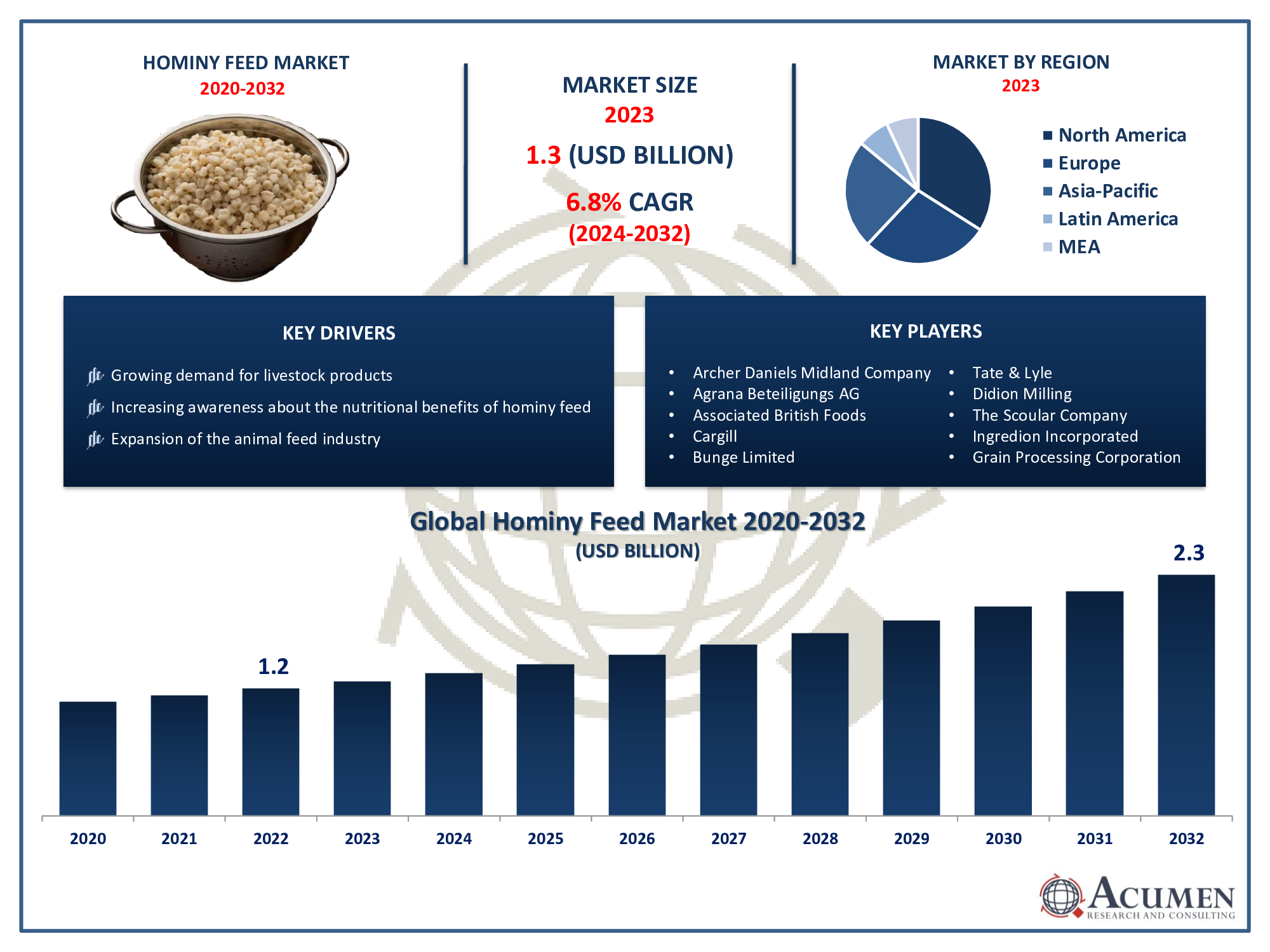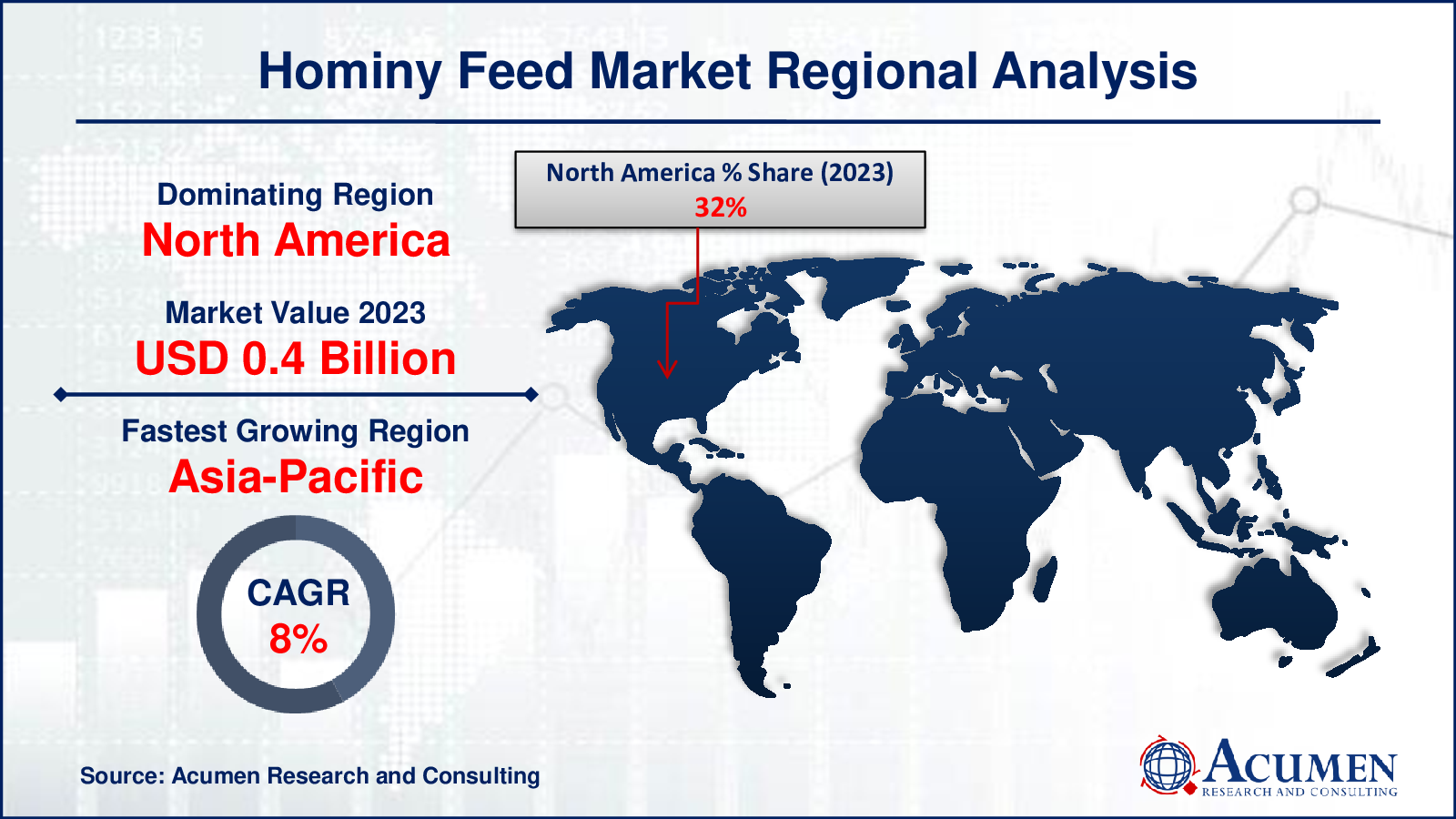Hominy Feed Market Size - Global Industry, Share, Analysis, Trends and Forecast 2024 - 2032
Published :
Report ID:
Pages :
Format :
Hominy Feed Market Size - Global Industry, Share, Analysis, Trends and Forecast 2024 - 2032
Report Coverage
- Industry Dynamics
- Market Size and Forecast Data
- Segment Analysis
- Competitive Landscape
- Regional Analysis with a Niche Focus on Country-Level Data
- High Level Analysis - Porter's, PESTEL, Value Chain, etc.
- Company Profiles of Key Players
- Option to Customize the Report As Per Your Specific Need
Request Sample Report
The Hominy Feed Market Size accounted for USD 1.3 Billion in 2023 and is projected to achieve a market size of USD 2.3 Billion by 2032 growing at a CAGR of 6.8% from 2024 to 2032.
Hominy Feed Market Highlights
- Global hominy feed market revenue is expected to increase by USD 2.3 Billion by 2032, with a 6.8% CAGR from 2024 to 2032
- North America region led with more than 32% of hominy feed market share in 2023
- Asia-Pacific hominy feed market growth will record a CAGR of more than 7.5% from 2024 to 2032
- By type, the white hominy segment captured more than 67% of revenue share in 2023
- By application, the livestock feed segment is projected to expand at the fastest CAGR over the projected period
- Rising focus on sustainable feed ingredients, drives the hominy feed market value

Hominy feed is a byproduct of the process used to produce hominy, which is made from dried maize kernels that have been treated with an alkali, typically lye or lime. This treatment removes the hull and germ of the maize, resulting in swollen kernels with a chewy texture. After the hominy kernels are separated, the remaining components, including the bran and germ, are often ground into a coarse meal called hominy feed.
In terms of market growth, hominy feed has seen steady demand, particularly in the animal feed industry. It is valued for its nutritional content and versatility as a feed ingredient for livestock, including pigs, poultry, and cattle. Rich in carbohydrates, fiber, and protein, hominy feed serves as an economical source of energy and nutrients for animals. Additionally, its availability as a byproduct of hominy production makes it a cost-effective option for feed manufacturers. As the demand for livestock products continues to rise globally, the market for hominy feed is expected to expand further, driven by the need for sustainable and nutritious animal feed ingredients.
Global Hominy Feed Market Trends
Market Drivers
- Growing demand for livestock products
- Increasing awareness about the nutritional benefits of hominy feed
- Expansion of the animal feed industry
- Rising focus on sustainable feed ingredients
- Availability of hominy feed as a cost-effective byproduct
Market Restraints
- Fluctuations in maize prices
- Competition from alternative feed ingredients
Market Opportunities
- Innovation in hominy feed processing techniques
- Adoption of technology for improved efficiency in feed production
Hominy Feed Market Report Coverage
| Market | Hominy Feed Market |
| Hominy Feed Market Size 2022 | USD 1.3 Billion |
| Hominy Feed Market Forecast 2032 | USD 2.3 Billion |
| Hominy Feed Market CAGR During 2023 - 2032 | 6.8% |
| Hominy Feed Market Analysis Period | 2020 - 2032 |
| Hominy Feed Market Base Year |
2022 |
| Hominy Feed Market Forecast Data | 2023 - 2032 |
| Segments Covered | By Type, By Crop Type, By Application, And By Geography |
| Regional Scope | North America, Europe, Asia Pacific, Latin America, and Middle East & Africa |
| Key Companies Profiled | Archer Daniels Midland Company (ADM), Agrana Beteiligungs AG, Associated British Foods (ABF), Cargill, Bunge Limited, Tate & Lyle, Didion Milling, The Scoular Company, Ingredion Incorporated, and Grain Processing Corporation. |
| Report Coverage |
Market Trends, Drivers, Restraints, Competitive Analysis, Player Profiling, Covid-19 Analysis, Regulation Analysis |
Hominy Feed Market Dynamics
Hominy feed is a byproduct derived from the production of hominy, a food product made from dried maize kernels that have been treated with an alkali, such as lye or lime. The process of making hominy involves removing the hull and germ of the maize, resulting in swollen kernels with a chewy texture. After the hominy kernels are separated, the remaining components, including the bran and germ, are ground into a coarse meal known as hominy feed. Hominy feed finds widespread applications in the animal feed industry due to its nutritional composition and affordability. It serves as a valuable feed ingredient for various livestock, including pigs, poultry, and cattle. Rich in carbohydrates, fiber, and protein, hominy feed provides essential nutrients and energy for livestock growth and production. Its versatility allows it to be incorporated into different feed formulations, contributing to the overall health and well-being of animals.
The hominy feed market has experienced steady growth in recent years, driven by several factors. One key driver is the increasing demand for livestock products globally, which has spurred the need for nutritious and cost-effective feed ingredients. Hominy feed, with its rich nutritional profile and versatility, has emerged as a favored option for animal feed manufacturers seeking sustainable solutions. Additionally, the expansion of the animal feed industry and the growing awareness about the benefits of hominy feed have further propelled market growth. Moreover, the availability of hominy feed as a byproduct of hominy production has contributed to its market expansion. This aspect enhances the cost-effectiveness of hominy feed, making it an attractive choice for feed manufacturers looking to optimize their production processes and reduce waste. As a result, the market for hominy feed has seen increased adoption across various livestock sectors, including poultry, swine, and cattle.
Hominy Feed Market Segmentation
The global hominy feed market segmentation is based on type, form, application, and geography.
Hominy Feed Market By Type
- Yellow Hominy
- White Hominy
According to the hominy feed industry analysis, the white hominy segment accounted for the largest market share in 2023. White hominy, derived from maize kernels treated with alkali to remove the hull and germ, offers a distinct nutritional profile and texture compared to other types of hominy feed. Its popularity stems from its versatility and suitability for various animal feed applications. The segment has benefited from the increasing demand for high-quality feed ingredients, particularly in regions with a significant livestock industry. Furthermore, white hominy's market growth can be attributed to its appeal as a premium feed ingredient. Livestock producers often prioritize feed formulations that offer optimal nutrition to enhance animal health and performance. White hominy's superior nutritional content, including carbohydrates, fiber, and protein, makes it an attractive choice for inclusion in feed formulations aimed at maximizing animal growth and productivity.
Hominy Feed Market By Form
- Crushed Hominy
- Whole Hominy
In terms of forms, the whole hominy segment is expected to witness significant growth in the coming years. Whole hominy, which consists of maize kernels treated with alkali to remove the hull but retaining the germ, offers distinct nutritional advantages and texture compared to other forms of hominy feed. Its market growth is propelled by increasing demand for premium feed ingredients with enhanced nutritional profiles, particularly in regions with thriving livestock industries. Whole hominy's unique composition, rich in carbohydrates, fiber, and essential nutrients, makes it a sought-after option for livestock producers aiming to optimize animal health and performance. Moreover, the whole hominy segment benefits from its versatility and suitability for a wide range of animal feed applications. Its inclusion in feed formulations for poultry, swine, and cattle has contributed to its rising popularity among feed manufacturers seeking to meet the evolving demands of livestock producers.
Hominy Feed Market By Application
- Livestock Feed
- Human Consumption
- Industrial Uses
According to the hominy feed market forecast, the livestock feed segment is expected to witness significant growth in the coming years. As the demand for livestock products continues to rise globally, there is a growing need for high-quality and sustainable feed ingredients to support optimal animal nutrition and health. Hominy feed, with its rich nutritional profile and versatility, has emerged as a favored choice among feed manufacturers catering to the needs of various livestock sectors, including poultry, swine, and cattle. Its inclusion in feed formulations helps to meet the dietary requirements of animals, thereby enhancing growth rates, improving feed efficiency, and ultimately increasing productivity for livestock producers. Furthermore, the livestock feed segment's growth is fueled by increasing consumer awareness about the importance of nutrition in animal husbandry and the benefits of using quality feed ingredients. Livestock producers are increasingly prioritizing feed formulations that offer balanced nutrition and promote animal welfare, driving the demand for premium feed ingredients like hominy feed.
Hominy Feed Market Regional Outlook
North America
- U.S.
- Canada
Europe
- U.K.
- Germany
- France
- Spain
- Rest of Europe
Asia-Pacific
- India
- Japan
- China
- Australia
- South Korea
- Rest of Asia-Pacific
Latin America
- Brazil
- Mexico
- Rest of Latin America
The Middle East & Africa
- South Africa
- GCC Countries
- Rest of the Middle East & Africa (ME&A)

Hominy Feed Market Regional Analysis
North America has emerged as a dominating region in the hominy feed market due to several key factors. One significant reason is the region's robust livestock industry, which encompasses a wide range of animals, including poultry, swine, and cattle. The United States and Canada, in particular, boast large-scale commercial livestock operations that require substantial quantities of feed to support animal growth and productivity. Hominy feed, with its nutritional benefits and cost-effectiveness, has become a staple ingredient in many feed formulations across North America, driving its dominance in the market. Moreover, North America benefits from a well-developed infrastructure for maize production and processing, which are essential components of hominy feed production. The region's abundant maize supply ensures a consistent and reliable source of raw materials for hominy feed manufacturers, enabling them to meet the growing demand from the livestock industry. Additionally, the presence of established feed manufacturers with advanced production facilities and distribution networks further strengthens North America's position as a leading player in the hominy feed market. Furthermore, favorable government policies and regulations, along with stringent quality standards, contribute to North America's dominance in the hominy feed market.
Hominy Feed Market Player
Some of the top hominy feed market companies offered in the professional report include Archer Daniels Midland Company (ADM), Agrana Beteiligungs AG, Associated British Foods (ABF), Cargill, Bunge Limited, Tate & Lyle, Didion Milling, The Scoular Company, Ingredion Incorporated, and Grain Processing Corporation.
Frequently Asked Questions
What was the market size of the global Hominy Feed in 2023?
The market size of Hominy Feed was USD 1.3 Billion in 2023.
What is the CAGR of the global hominy feed market from 2024 to 2032?
The CAGR of hominy feed is 6.8% during the analysis period of 2024 to 2032.
Which are the key players in the hominy feed market?
The key players operating in the global market are including Archer Daniels Midland Company (ADM), Agrana Beteiligungs AG, Associated British Foods (ABF), Cargill, Bunge Limited, Tate & Lyle, Didion Milling, The Scoular Company, Ingredion Incorporated, and Grain Processing Corporation.
Which region dominated the global hominy feed market share?
North America held the dominating position in hominy feed industry during the analysis period of 2024 to 2032.
Which region registered fastest CAGR from 2024 to 2032?
Asia-Pacific region exhibited fastest growing CAGR for market of hominy feed during the analysis period of 2024 to 2032.
What are the current trends and dynamics in the global hominy feed industry?
The current trends and dynamics in the hominy feed industry include growing demand for livestock products, increasing awareness about the nutritional benefits of hominy feed, and expansion of the animal feed industry.
Which form held the maximum share in 2023?
The whole hominy form held the maximum share of the hominy feed industry.


